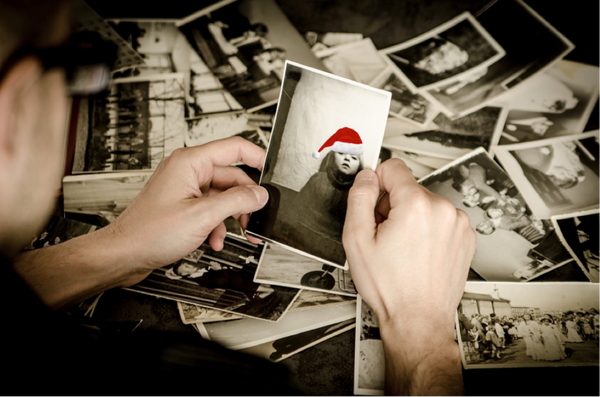This article was published in Scientific American’s former blog network and reflects the views of the author, not necessarily those of Scientific American
It’s that time of year again. Cookies, cold noses, festive socks, reindeer, eggnog, and, perhaps most importantly of all, sharing memories with family and friends.
Over the upcoming holidays your loved ones will undoubtedly drag out dusty anecdotes, many of which you probably hoped would have been long forgotten. Dad jokes will fill the halls while the family passes around your grade seven dance photos for the 10th year in a row. Embarrassing.
Some of these stories you probably get to hear Every. Single. Christmas. But some of these recollections may catch you off guard, leading to you having a conversation much like this:
On supporting science journalism
If you're enjoying this article, consider supporting our award-winning journalism by subscribing. By purchasing a subscription you are helping to ensure the future of impactful stories about the discoveries and ideas shaping our world today.
Family member: “Do you remember when you …. ?”
You: “No… should I?”
Your family member wants to share a memory with you, and you not remembering seems to make the disclosure all the more important. As human beings who love to hear stories, particularly stories in which we feature as the protagonist, it feels right to indulge them. But, according to science, should you let family take you down memory lane?
Imagination Inflation
As a researcher who studies memory, I am tempted to say that you should proceed with extreme caution when your family starts to share memories of you that you don’t remember.
There are a few major reasons for this. First, you have an imagination and you will use it. In what is scientifically called “imagination inflation”, imagining an event happening increases our confidence that the event has actually occurred, even when it hasn’t. This is particularly true when on top of imagining what could have happened you also picture how it could have made you feel. In other words, the more sensory details we picture, the more real these imagined events feel.
This means that when mom tells you about that time you were laughing your little head off when you sat on Santa’s lap, even if you don’t actually remember the event, you’ll find that it is easy enough to picture it happening. You know what Santa Claus looks like. You know what laughing feels like. You know what the background Christmas music would sound like. With minimal effort you have transported yourself back into a moment that you didn’t initially remember.
But how can you tell whether it is your memory you are recalling or your mother’s? Unfortunately, it’s likely that you won’t be able to tell, since imagined events can both look and feel the same as memories of things you actually experienced. Only if you had corroborating evidence - like a photo of the moment - could you know whether your memory details were generally accurate or just made up.
Merry Memory Thieves
This is made all the more complicated when the following week you fondly recall your recently regained Santa memory, and your sister Sue says “Hey! That wasn't you, that was me on Santa’s lap!”. Of course, Sue might just be a dirty liar. More likely, however, is that mom just helped you steal Sue’s memory. Research shows that we are surprisingly often guilty of being memory thieves, stealing other peoples’ memories and telling them as if they were our own.
In a 2015 study on “borrowed” personal memories, over half of people questioned indicated they had arguments with others about memory ownership. Of course, usually we don’t notice that we have stolen a memory unless we happen to disclose it to the person it belongs to, and they actively confront us about it.
When memory thievery is unintentional, with the rememberer not realising they are telling another’s’ story, it can be called a “false memory”. False memories are accounts that feel real to us although we never actually experienced them, and can be the result of mere suggestion. Mom says it happened, so it must have happened, so it did happen. We then unintentionally fill in the details with our imagination.
Keep this in mind next time you catch a family member telling one of your stories as if it was theirs; they may not be aware they are stealing a piece of your past.
Better Together
While we can distort each others memories, some research has also shown benefits of reminiscing with our loved ones. In a really cool study involving elderly couples who knew each other incredibly well (for a whopping 31 years on average), researchers found that the way in which people reminisced mattered. When recalling an event together couples made fewer mistakes than when they recalled the event alone. This was particularly the case when couples acknowledged, repeated, rephrased, and elaborated on what the other partner was saying.
It seems that sharing a memory with a loved one may well result in us remembering the event more accurately, but only if we start with an event we already remember. If we don’t initially remember the event, friends and family may well just be giving us a false memory.
This holiday season, aim to protect yourself from distorted memories by always being cautious, curious, and kind; cautious of unfamiliar memories, curious when sharing memories, and kind if you happen to spot a memory thief.
Happy holidays.
This post is part of a series of articles that focus on debunking common misconceptions and beliefs about how our memory works.
Dr. Julia Shaw works at London South Bank University in the department of Law and Social Sciences. She is a senior lecturer, researcher, and author of The Memory Illusion: Why you may not be who you think you are, to be published on June 2nd, 2016, by Penguin Random House.
